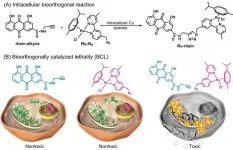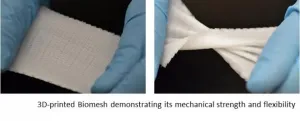SARS-CoV-2 reacts to antibodies of virus from 2003 SARS outbreak, new study reveals
OHSU study has important implications for vaccines, diagnosis of COVID-19
2021-01-25
(Press-News.org) A new study demonstrates that antibodies generated by the novel coronavirus react to other strains of coronavirus and vice versa, according to research published today by scientists from Oregon Health & Science University.
However, antibodies generated by the SARS outbreak of 2003 had only limited effectiveness in neutralizing the SARS-CoV-2 virus. Antibodies are blood proteins that are made by the immune system to protect against infection, in this case by a coronavirus.
The study published today in the journal Cell Reports.
"Our finding has some important implications concerning immunity toward different strains of coronavirus infections, especially as these viruses continue to mutate," said senior author Fikadu Tafesse, Ph.D., assistant professor of molecular microbiology and immunology in the OHSU School of Medicine.
Given the speed of mutations - estimated at one to two per month - it's not surprising that an antibody generated from a virus 18 years ago provides a meager defense against the new coronavirus. Nonetheless, Tafesse said the findings suggest more work needs to be done to determine the lasting effectiveness of COVID-19 vaccines.
"I don't think there is any one size-fits-all vaccine," he said. "Although the vaccines coming out now may break the momentum of the virus and end the pandemic, they may not be the end game."
Tafesse noted that researchers used individual antibody clones to test cross-reactivity, and that a body's normal immune system will generate many antibodies that are more likely to neutralize a wider series of targets on the mutating virus.
"I'm not personally terribly concerned," said lead author Timothy Bates, a fourth-year molecular microbiology and immunology graduate student in the OHSU School of Medicine. "Emerging mutant viruses may have some propensity to escape certain antibodies raised by previous infection or vaccine.
"Every individual has a different immune system that will make a unique repertoire of different antibodies that bind to different places on the virus, so the chance of any one SARS-CoV-2 variant escaping from all of them is quite low."
The study also suggests that efforts to accurately discern a previous COVID-19 infection, by analyzing antibodies in blood, may be confounded by the presence of antibodies reacting to other strains of coronavirus including the common cold. Although this complicates diagnosis of older infections, researchers say the finding actually expands scientists' ability to study the biology and disease-causing effects of the SARS-CoV-2 virus since they know it reacts to antibodies of multiple strains of coronaviruses.
"It provides more tools to study the biology of this virus because we have very limited reagents available right now for SARS-CoV-2," Tafesse said.
INFORMATION:
The work was supported by the National Institutes of Health, training grant T32A1747225; OHSU Innovative IDEA grant 1018784; OHSU Proteomics Shared Resource facility and equipment grant number S10OD023413.
ELSE PRESS RELEASES FROM THIS DATE:
2021-01-25
Astrocytes are the most abundant type of cells within the central nervous system (CNS), but they remain poorly characterized. Researchers have long assumed that astrocytes' primary function is to provide nutrients and support for the brain's more closely scrutinized nerve cells; over the years, however, increasing evidence has shown that astrocytes can also actively promote neurodegeneration, inflammation, and neurological diseases. Now, a team led by researchers from Brigham and Women's Hospital, has shown that a specific astrocyte sub-population can do the opposite, instead serving a protective, anti-inflammatory function within the brain based on signals regulated by the bacteria that reside in ...
2021-01-25
-Data demonstrate ADG2 binds to all known variants of SARS-CoV-2 and is not impacted by known circulating resistance mutations-
-Company expects to begin clinical studies for a half-life extended version of ADG2 for the treatment and prevention of COVID-19 in early 2021-
Waltham, MA - January 25, 2021- Adagio Therapeutics, Inc., a biotechnology company developing best-in-class antibodies to broadly neutralize coronaviruses, today published in vitro and in vivo data in Science on its lead antibody candidate, ADG2, which demonstrated similar or higher potency against SARS-CoV-2 compared to other monoclonal antibodies (mAbs) in clinical development and strong binding to all known ...
2021-01-25
Working in preclinical models, researchers report that plitidepsin, a drug with limited clinical approval for the treatment of multiple myeloma, is more potent against SARS-CoV-2 than remdesivir, an antiviral that received FDA emergency use authorization for the treatment of COVID-19 in 2020. The results suggest plitidepsin should be further evaluated as a COVID-19 therapy, the authors say; because it targets a host protein rather than a viral protein, if treatment proves successful in humans, the SARS-CoV-2 virus won't be easily able to gain resistance ...
2021-01-25
A new approach to mapping viral mutations that "escape" leading clinical antibodies has revealed mutations in the SARS-CoV-2 virus that allow it to evade treatments, including a single amino-acid mutation that fully escapes Regeneron's antibody cocktail. These maps, say the authors, demonstrate that prior characterization of escape mutations was incomplete. They will also help to enable immediate interpretation of the effects of the mutations cataloged by viral genomic surveillance, say the authors. Several antibodies are in use or under development as therapies to treat COVID-19. As new SARS-CoV-2 variants emerge, it ...
2021-01-25
Researchers have engineered an antibody that neutralizes SARS-CoV-2 with a potency that "rivals" current lead SARS-CoV-2 clinical neutralizing antibodies, and that also broadly neutralizes a range of clade 1 sarbecoviruses. Their antibody, ADG-2, studied in mice, represents a "promising candidate" for the prevention and treatment of not only COVID-19, they say, but also of future respiratory diseases caused by SARS-related coronaviruses. Although two vaccines and two monoclonal antibody (mAb) therapies have been authorized for emergency use by the FDA, it is unknown whether these vaccines and treatments will provide broad protection against new emerging SARS-CoV-2 strains that originate in humans or animal reservoirs; this is partly ...
2021-01-25
During the first wave of the COVID-19 pandemic, nearly one in four families responded that they would be unlikely to bring their child to the Emergency Department if they had an emergency condition, according to a survey from Ann & Robert H. Lurie Children's Hospital of Chicago published in the journal Academic Emergency Medicine. Greater hesitancy to seek emergency care was found in families living in under-resourced communities, those who rely on public insurance and in families who are Black, Latinx or Asian.
"We observed greater hesitancy to use the Emergency Department among more vulnerable demographic groups who historically showed high utilization of emergency care for their children," ...
2021-01-25
Cancer is the second leading cause of death in the world. The number of deaths and incidences is increasing each year. The metal-based anticancer drugs were used clinically worldwide, but suffer from poor selectivity, serious side effects and drug resistance. Tumor-targeting drug development is the basis for precise cancer treatment.
Recently, Professor Hongke Liu of Nanjing Normal University, Professor Jing Zhao and Academician Zijian Guo of Nanjing University have made breakthrough achievements in anticancer drug development. They proposed a "bio-orthogonally catalyzed lethality" (BCL) strategy ...
2021-01-25
Hernias are one of the most common soft tissue injuries. Hernias form when intra-abdominal content, such as a loop of the intestine, squeezes through weak, defective or injured areas of the abdominal wall.
The condition may develop serious complications, therefore hernia repair may be recommended. Repair consists of surgically implanting a prosthetic mesh to support and reinforce the damaged abdominal wall and facilitate the healing process. However, currently used mesh implants are associated with potentially adverse postsurgical complications.
"Although hernia mesh implants are mechanically strong and support abdominal tissue, making the patient feel comfortable initially, ...
2021-01-25
Musical notes that sound pleasant together can form a harmony. These notes are usually in a special relationship with each other: when expressed as frequencies, their ratios result in simple fractions, such as four-thirds or three-halves. Similarly, a planetary system can also form a kind of harmony when planets, whose orbital period ratios form simple fractions, regularly attract each other with their gravity. When one planet takes three days to orbit its star and its neighbor takes two days, for example. Using the CHEOPS space telescope, scientists, led by astrophysicist Adrien Leleu of the Center for Space and Habitability of the University of Bern, the University of Geneva and ...
2021-01-25
HOUSTON - (Jan. 25, 2021) - A new theory that could explain how unconventional superconductivity arises in a diverse set of compounds might never have happened if physicists Qimiao Si and Emilian Nica had chosen a different name for their 2017 model of orbital-selective superconductivity.
In a study published this month in npj Quantum Materials, Si of Rice University and Nica of Arizona State University argue that unconventional superconductivity in some iron-based and heavy-fermion materials arises from a general phenomenon called "multiorbital singlet pairing."
In superconductors, electrons form pairs and flow without resistance. Physicists cannot fully explain how ...
LAST 30 PRESS RELEASES:
[Press-News.org] SARS-CoV-2 reacts to antibodies of virus from 2003 SARS outbreak, new study reveals
OHSU study has important implications for vaccines, diagnosis of COVID-19



